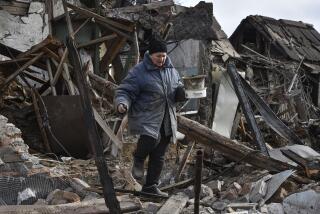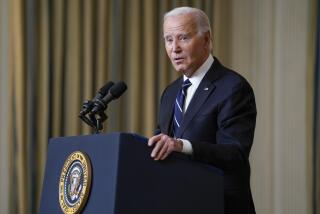NATO Air Strike Backs Words With Action
- Share via
WASHINGTON — Sunday’s air attack by two U.S. F-16C fighters on Bosnian Serb forces outside the besieged Bosnian city of Gorazde crossed a line from which Western political leaders had tiptoed away from for two years: It suddenly escalated the role of the United States and its European allies in the intractable Balkans warfare.
The bombing run had only a limited military purpose, but its political message packed a wallop. After two years of idle threats to halt Serbian aggression in Bosnia-Herzegovina, the West at last supported its words with deeds.
“We had said we would act if requested to do so,” President Clinton said. “We have now done so and will do so again if we are requested.”
A former Air Force intelligence officer who was at the Pentagon as the raids were being carried out said later in an interview: “You’ve crossed a divide here. Finally, finally, they ran in U.N. troops and said, ‘If you fire on them, we’re going to bomb you.’ The Serbs tested them, and NATO passed the test.”
U.S. aircraft had tangled briefly in February with six Bosnian Serb airplanes that violated a “no fly” zone, and four of the Serbian planes were shot down. And U.N. forces threatened air strikes to enforce a call for Bosnian Serb forces to pull their heavy artillery back from the Bosnian capital of Sarajevo. The Bosnian Serbs complied before any strikes were ordered.
Before Sunday, North Atlantic Treaty Organization forces had not been involved in close air support directed at protecting U.N. troops hemmed in on the ground by Bosnian Serbs--a role similar to that performed by U.S. Air Force fighters bailing out ground troops under fire a generation ago in Vietnam.
Pentagon officials made the point of differentiating between Sunday’s mission, intended to quickly give 12 U.N. observers some breathing room, and formal air strikes, which are often planned well in advance and are intended to destroy an enemy’s weaponry.
The air raid came after a week of mixed signals from senior Clinton Administration military and foreign policy officials as Gorazde, a largely Muslim community designated as a haven from Serbian attack, came under increasing military pressure.
A week ago, Defense Secretary William J. Perry ruled out the use of U.S. troops to prevent Bosnian Serbs from capturing additional territory as Bosnian Serb forces bombarded Gorazde, in eastern Bosnia, where 65,000 people were trapped.
Asked whether the United States would consider air strikes or armed intervention to prevent the fall of Gorazde, Perry said: “We will not enter the war to stop that from happening.”
A day later, Clinton pledged that NATO would provide air support for U.N. peacekeeping troops about to be dispatched to Gorazde.
On Thursday, Anthony Lake, the President’s national security adviser, said the Administration would not be willing to use U.S. air power to stop Serbian attacks on the city before U.N. troops arrived there. But he also said neither the President nor his advisers “rules out the use of NATO power to help stop attacks such as those against Gorazde.”
Then on Sunday morning, Secretary of State Warren Christopher said on the NBC news program “Meet the Press” that if the U.N. commander in Bosnia, Lt. Gen. Michael Rose, asked for NATO air support, “we’re going to be paying a lot of attention to that and responding.”
Within an hour, the F-16Cs had struck.
The request for the air support went up the NATO chain of command and, in sharp contrast to an incident last month, approval was granted within 25 minutes. When French peacekeepers asked for air support in March, authorization was granted more than three hours later, and by then the Bosnian Serb forces had already taken cover.
Sunday’s raid was conducted by aircraft from the NATO base at Aviano, Italy.
“This was a picture-perfect one,” said Madeleine Albright, the U.S. ambassador to the United Nations, during an interview on CNN.
The Pentagon said the two fighters were under the direction of a U.N. forward air controller--a soldier on the ground near the site of the target.
The former Air Force intelligence officer took this to mean that the West had been planning a low-scale message-sending operation for at least several days, because of the time it takes to place a skilled air controller on the ground.
NATO Strikes
Dispatched by NATO, two U.S. F-16C fighter planes struck Bosnian Serb targets near the besieged Muslim enclave of Gorazde.
* Use: Multipurpose tactical fighter-bomber
* Top speed: Over 1,000 m.p.h.
* Weapons: Can carry 12,000 pounds of nuclear or non-nuclear weapons
Source: Associated Press
More to Read
Sign up for Essential California
The most important California stories and recommendations in your inbox every morning.
You may occasionally receive promotional content from the Los Angeles Times.













